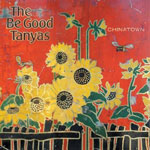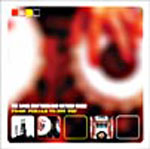From Banjo To Bhangra
| |

| After the somewhat unexpected excitement generated by their first cd I wondered how they would ensure the same response to the next one. Ah, the 'difficult' second album. They could have been slogging down that dusty trail to obscurity, with a truck full of unfashionable banjos, mandolins and guitars. Not that I imagine any one of them would have given a flying fiddle had that been the case. Success crept up on them and could have crept away as swiftly. But if anyone thought 'Blue Horse' was a one-off lucky strike by a bunch of charming chancers they were wide of the mark. Equally if they thought it was about as low-key as you could get then this one throws down the gauntlet and offers a peculiar challenge. They have stayed fairly true to their unadorned debut with a couple of notable instrumental additions, and the vocals mostly breath rather than shout at you. These former tree planters also exhibit a healthy interest in death, that most low-key of subjects, whether on the traditional 'In My Time Of Dying' and 'I Wish My Baby Was Born' or the more contemporary second instalment of Samantha Parton's canine lament 'Dogsong 2'. This last tune sees the expanding instrumentation stretching to musical saw and bowed bass. Both add more muted colours to the overall Tanya sound and Aaron Chapman plays as fine a saw solo as I've ever heard. A rare beauty. Junkies and the homeless give Frazey Ford a chance to come up with the exquisite 'Junkie Song' about walking in your 'neighbourhood/two in the morning' and having to 'hover/between apathy and compassion'. Olu Dara's contribution on cornet is a fitting and welcome addition to the sound, being as light and unobtrusive as their own voices and instruments. And just when you think nobody can say anything more on that well-worn blues lament, 'my baby left me' Parton's 'Lonesome Blues', takes it and brings restraint and a lightness of touch underscored by Jolie Holland's gracefully soaring fiddle and Trish Klein's gently eloquent electric guitar. This really is one of their best efforts so far in terms of using a few well-chosen resources to move the stoniest of hearts. I've got it on repeat play and may well wear it out. Ford's 'In Spite Of All The Damage' appeals in a slightly different, but equally emotive way and has a dash of lonesome harmonica to enhance its tone of regret. They mix some other traditional pieces with their own material in a comfortably balanced way. The old chestnut, 'The House Of The Rising Sun', a spirited 'Reuben' and 'Rowdy Blues' further explore an interest in their legacy. The latter is anything but 'rowdy' of course with rippling banjo and more of those breathy vocals that are, or will be, the Tanyas trademark. All three tunes sit easily alongside the newer songs and blur distinctions in a seamless and timeless way. Overall the album takes its cue from 'Blue Horse' and, without resorting to formulaic repetition, develops their approach to making the music that they love and others do too. If I have any complaint it's just that I miss the strident lead vocals of Jolie Holland, such as those she delivered on 'Lakes Of Pontchartrain'. Still, she does contribute some harmonies and that fantastic fiddle. But that's my only quibble. Perhaps someone will offer her a solo album. Meanwhile join the converted and succumb to the seductive grace of this gentle masterpiece. |

| Yorkshire bhangra may sound an unlikely fusion. Perhaps not and I'm not sure it's a good way to describe this cd though it does fuse some elements of Doncaster's Angel brothers, on guitar and percussion with the dholak and tabla of Satnam Singh. And there are other stalwarts of the Yorkshire folk/world music sphere keeping them company. The two Andys, Cutting and Seward, add double bass, dulcimer, accordion and hurdy gurdy to the brew. And sometimes it's hard to describe what the result sounds like as on the last track, 'Climb The Wall', where Dave Angel's slide guitar clashes with Singh's hammer tabla and some gasping harmonica. Many of the tracks are joint compositions, often suggesting a kind of 'world jam' where Dave Angel's guitar is the focus around which the others add their various voices. The title track is one of these, where Hammond organ and accordion, courtesy of Dave Formula and Cutting, spread out a canvas over which Angel improvises. Singh sustains a steadily hammered pulse throughout. For some inexplicable reason they have decided to resurrect the traditional 'Black Waterside', a dull tune, or dirge, that would bore shit from a wooden horse. That aside there are many more interesting pieces that use the available instruments to better effect. Dave Angel's 'Days Like Diamonds' is an almost weightless expedition where Singh's understated percussion and Seward's bowed bass anchor the delicate glockenspiel. This leads into the multicultural 'Denaby Deliverance' which mixes banjo and thumb piano in another fusion that manages to avoid the uninspiring nature of that term. They cover a whole range of influences from Latin, dub and flashes of Celtic music. And they sound as though they enjoy it too. So if you fancy this, you might be interested in the band's latest 'fusion' with poet in residence everywhere, Ian McMillan. He has been adding words to these tunes, including a spot of Yorkshire film - noir and a nostalgic vignette about buying LPs in the 1970s, in this case one of Captain Beefheart's. There's talk of new words for new tunes so hopefully this collaboration will bear further fruit. I'm hoping for 'Big-Eyed Beans From Barnsley'. You never know. © 2003 Paul Donnelly |